
so it begins



Launch trailer:
Launch trailer:
Who's John Walker, can a good soul make a tl;dr of his whining ?


Italian review is out. 83/100
https://multiplayer.it/recensioni/1...sione-di-pillars-of-eternity-ii-deadfire.html
Dumpsterfire.THE VERDICT
88















5 hours of unpacking remaining, Infinitron was right
At least when Grimoire was released the game was playable immediately after a 60 Mb download
Review post:
MMORPG.com 10/10
GameSpace 9.8/10
CGMagazine 9.5/10
GamesBeat 92/100
Game Informer 8.75/10
PC Gamer 88/100
IGN 8.5/10
GameSpot 8/10
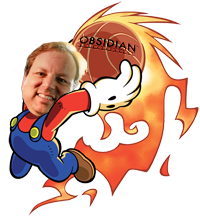
Launch trailer:

Launch trailer:
Wow, what a shitty trailer.
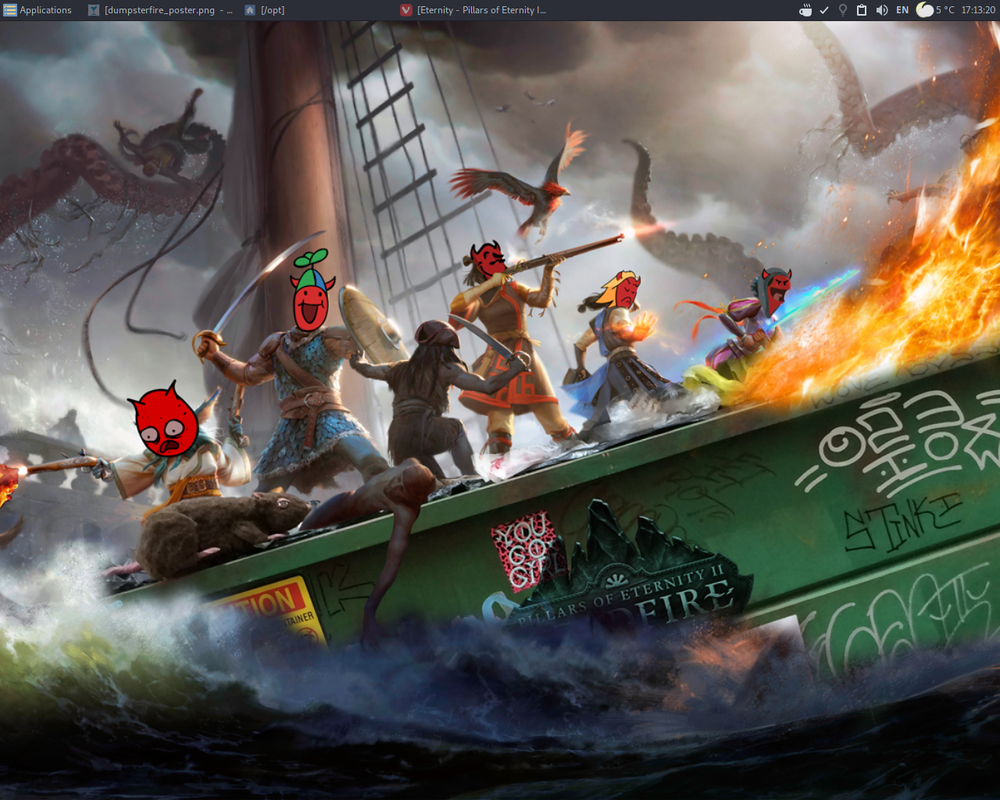

I don't want to defend the game, but it's very interesting that these deep problems with a game never occur to John Walker when he is playing some mainstream shit.RPS - review still in progress. Some whining from John Walker: https://www.rockpapershotgun.com/2018/05/08/pillars-of-eternity-ii-deadfire-review-in-progress/
Review In Progress: Pillars Of Eternity II: Deadfire

Pillars Of Eternity II is seemingly infinity hours long. Despite a week of playing, I’m still going, so here’s my in-depth thoughts about the game excluding the impact of its ending. I will update later.
What a lot Pillars Of Eternity II feels like it has to do. It needs to be a completely new dozens-of-hours-long RPG, while it also needs to be a sequel to 2015’s stunning first outing, while it needs to feel like it’s evolved from then, while it needs to feel like it’s faithful, while it… In many ways, it succeeds despite being tugged in all these directions. And in others, it feels wearily stretched from the process.
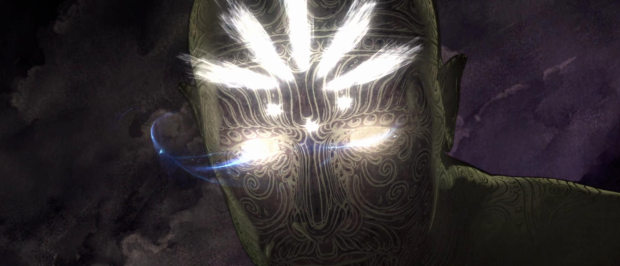
Such is the nature of this sequel that to explain its opening plot is to impose upon the ending of the last. There’s no real way around that. You’ll perhaps remember that PoE1 was about, amongst other things, a blight of soulless children on a region shortly after a god, who took on human form, had been killed. That god, Eothas, is back, and bigger. In a giant form, he erupts from the ground under your castle in Dyrwood, destroying it, and then strides off toward the archipelago of Deadfire, stamping on all sorts on his way.
The destruction of Caed Nua also destroys you, The Watcher, whoever you might have been in the first game, and sees you in the In-Between, confronted by Berath, the god of death. (Now, if you finished PoE1 you’ll be thinking, “But hang on…” and yes, it does address that rather sticky issue of deities, while at the same time rather fudging around it.) She wants you reborn, to tackle Eothas, and in the process gives you the chance to import an end-game save from the last game to bring over all your decisions, re-decide everything again in meticulous detail, and most of all, reroll your character entirely afresh.
However, despite being able to import your choices, for some reason you can’t import your actual Watcher. Which makes it a giant pain for anyone wanting their previous avatar. I wanted Ambree, my paladin from before, and had to load up PoE1 and copy all the minutiae of who she was to get it all right. Either way, your stats are scrapped and you start from level 1 again.

You awaken on a ship, your ship, to find that most aged of Bioware-inherited traditions in place: the most bland whitebread character possible first to join you. And it’s Eder, Mr Meh from the first game. Quickly you gather up rogue wizard Aloth. Then you bump into Pallegina, and… well, it becomes a little concerning this is going to feel like a band reuniting long after they should have retired. Thankfully, while there are more familiar faces to come, you can pull together a new team of new characters reasonably quickly.
This opening feels incredibly rushed. You wake up from death in a hand-drawn cutscene that obliterates your castle, and then you’re fleeing by ship to another land, bam. The impact of this almost incidental establishing lasts for a really long time, in a game that’s already extraordinarily open and loose, meaning that you’re going to have to do a lot of work yourself to let the events feel like they’re of any particular import or impact.
The counter to this, of course, is you’ve got an extraordinarily open and loose RPG, with a vast network of islands to explore, at your own pace, while introducing a whole new set of mechanics around owning and operating a ship, a crew, and indeed, the matter of ship combat.
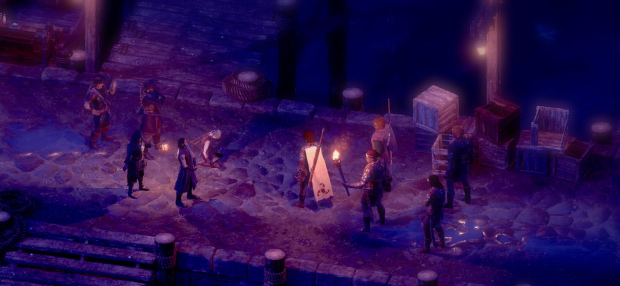
I think at this point how you receive the game will very much be determined by what you love most about this old-school model of RPG. If you play for the tight stories, propelled down a main quest by an urge to save the day, torn away to side quests because of the personalities of your adored gang, then PoE1 met your needs splendidly. If, however, you prefer to amble, to get lost down a quest line completely separate to the main reason you’re there, to get embroiled in the politics and matters of new communities and peoples, to pick and choose and just occasionally get back to the main quest as and when, the PoE2 has this in spades.
I am, undeniably, in the former camp, and have struggled with Deadfire’s sprawling nature. I’m not sure, though, that this is entirely on me. I suspect rather strongly that the big issue with what is, unquestionably, an astoundingly vast and intricate and often pleasing role-playing game, is that it fails to get across to me why anything that’s happening really matters.

It all appears to be a look at colonialism, at the spread of various trading companies around the 17th century, along with the piracy and seafare that accompanied this. As such, you can start to align yourself with one company over another, become a menace to the lot of them, or just try to keep out of it entirely.
Alongside this, there are many new cultures to discover, whose lives are heavily impacted by this colonialism. For example, there’s an exploration of a caste system, interestingly applied to an allegedly socialist society of the Huana. Wealth is redistributed, but based on a notion of a meritocracy, that in reality is an outdated hierarchy of class. The lowest caste, the Roparu, are essentially Dalits, patronised by the two tiers above (a working-middle class, and a royal upper class, the Mataru) as needing to be looked after, and then supposedly having grown too numerous to be cared for. Which is of course to say, never given adequate opportunity, and then grown in number such that to redistribute wealth fairly would mean the higher castes would get less… You can see the level of detail that is going in to such things, and this applies absolutely everywhere.

And as a part of an archipelago so strongly under the thrall of finances, money is a much more important factor this time around. In PoE1, I think the aspect of employing staff at Caed Nua, and paying them regular wages, was a little undercooked. You never really needed to think about it at all. In PoE2 it’s much more crucial, especially early on when cash is tight.
You get between the many islands by boat, always, and on the way you could run into watery trouble. To be able to outrun, out-cannon, or out-fight another boat’s crew, you need people on board. You can hire workers at ports, and pick them up through side quests, each with a set of starting skills. Perhaps they know a bit of cooking, or their way around the rigging. Assign them to the appropriate space on your ship layout, and then they start to gain levels in their abilities through practice. Also, they may get injured, which means taking them off duty for a few days, and ideally in the care of your hired ship’s surgeon. So you may want back-up crew for such times. Oh, and they’re all going to not only need paying, but also food, drink, and medical supplies, which can be bought, scavenged and stolen on your journey. And all of these aspects, alongside victories and failures in naval battles, as well as little adventures, affect your crew’s morale. Let it get to low and they will be far less effective. Let it get very low and they may mutiny.
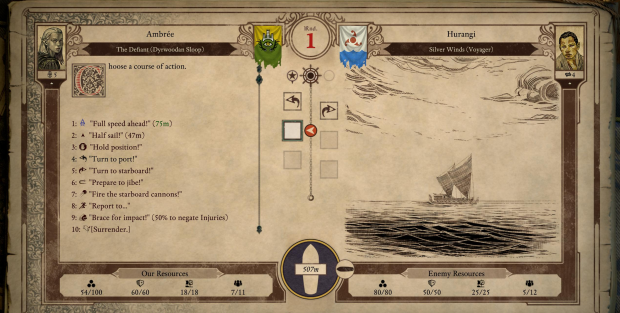
It sounds like a lot, but it’s all well implemented, and once you’ve gotten the hang of it it really doesn’t interrupt the flow. It’s just the getting the hang of it part that’s a problem, with the game woefully bad at explaining it all to you. I spent so long not understanding why crew weren’t getting healed by the surgeon, for instance, and really couldn’t get to grips with how to recover morale. This is not helped by a very peculiar decision, in a game that wears the rest of its stats ridiculously loudly, to hide all the numbers for your crew. Instead there’s a really very silly system of unexplained studs and stars on their pop-up tooltip, that fails to properly communicate at any point the standard of your ship and crew.
Ship combat is then a whole other learning experience, and you may be surprise/relieved to learn, isn’t about a little arcade game in the midst of RPGing. It is, in fact, entirely text based. It all plays out like a little Twine game. I’ll go into more detail about this in a separate piece tomorrow, but it’s a superbly implemented choose-your-own-ship-battle, where your crew’s experience and the equipment on board play out in a series of turn-based decisions of tactical positioning, cannon firing, and crew maintenance.
Ship fights can end either by sinking the enemy boat, or by boarding it and having a fight back in the main game engine. But rather tragically, the two don’t integrate at all meaningfully, meaning hopes that deliberate using cannon shot that takes out crew members to thin down for an eventual fisticuffs battle isn’t even a thing. It’s such an obvious thing to have included, and really hugely disappointing to discover isn’t there. Instead if you board they magically have a full crew again to fight you. Sigh.
More ridiculously, by the time your own team is of a decent level, it’s far quicker to eschew the splendid Twine-like section, and just whomp them in a 30 second fight, and that way you get more loot for your efforts. A real mess of balancing, and a really sad way to mess up one of the best new features.
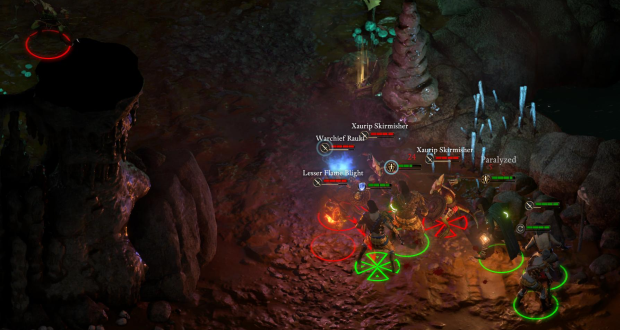
On dry land, things play out much as you might expect from an Obsidian RPG, a collection of enormous towns packed with NPCs, mini-quests, taverns and plot-critical estates and temples, alongside single-use dungeons and infiltrated strongholds. Although to get to them, there’s a larger map view for each island, your team moved around as an icon, with time passing as you travel long distances.
As for combat, in many ways it’s similar to PoE1, and indeed the current vogue for pausable real-time RPG combat – each of your characters’ turns is on a timer dependent upon ability and equipment, and you can meticulously manage every action of all five in your present team, or let it play itself out with its AI if you’ve the difficulty low enough/the encounter is simple enough. Most of the time it’s a combination of the two.
However, there have been some attempts to streamline aspects of it, and complicate others. Wizards can restore spells without resting now, while there’s a new ability called Empower that allows you to either restore half of any character’s spent resources, or soup up a specific spell or ability for the duration of that battle, once per encounter. I played on “Classic”, which is the game’s version of Normal, and there’s a Relaxed below that for battles where you can mostly leave them to it, and a Story even lower than that for making fights immaterial.
Then of course there’s Veteran for those looking for a challenge, and beyond that the madness that is Path of the Damned. I suspect for those who enjoy the minutiae of such combat, it’s here that the min-maxing complexity that’s available will shine. And there’s the Expert mode for masochists who want all the useful on-screen information obfuscated. For those of us who prefer to just choose when to lob a fireball, and when to heal a chum, Classic makes this just a bit too simplistic this time out, while higher than that becomes too much of a fiddle.

Saying this, they’ve made the very odd choice to let you change difficulty at any point, but it only affects areas you’ve yet to visit. So if you meet an encounter you can’t get through, er, tough.
More strange, lowering the difficulty to Relaxed also strips the game down entirely of its level gating, and levels every part of the game to your team. This perhaps seems like it’s helping the player not get into scrapes that are too difficult, but it also has the effect of making the entire world simultaneously accessible, in a way that muddles the storytelling.
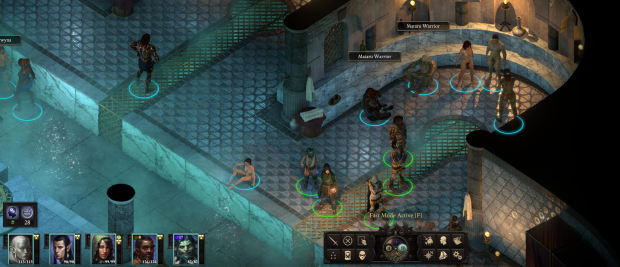
And wow is the storytelling muddled. The game has so, so many quests open at once, and makes so little effort to make clear what’s happening where and why, that I more often accidentally completed them than deliberately. You can sort quests by the order you received them, or by location, but neither is helpful. The latter especially because sometimes it sorts them by the location where you received them, not where they actually take place, other times only one of multiple locations, and often fails to include key information about where to report them back when completed. With nineteen or twenty open quests at any time, this is dreadful. And even more so when there’s no way to track missions on the map, nor even assign one as your primary focus.
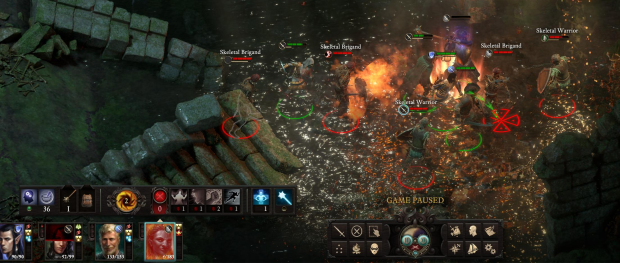
But more important is the lack of weight to most things happenings. When a game’s main plot is that a vast god is stamping entire cities into the ground with each step, you’d imagine there’d be a notion of urgency about this. Yet the Eothas story feels so, so far in the background for so much of the game. It is at once too big and too incidental. The game is for so long far more interested in the astoundingly dull political machinations of a collection of rival trading companies, and the pirates that frustrate them. Petty personal rivalries seem to be the centre of all disagreements, so you do the usual of taking sides, negotiating, or just killing everyone involved.
There’s such a vast amount to do here, and doing much of it is absorbing and entertaining, but ultimately it feels so loose and wayward. Far too much is about being pulled back and forth by the gods, which was last time’s story, and here takes place far too often in long-winded conversation cards that offer you little real choice.
I’ve really enjoyed playing through some of the vignettes, multi-layered dungeons with secrets and multi-part quests, ending with a decent fight. But when they’re done, it’s hard to remember what it was about, and harder to fathom how it connects to anything else that’s happening.
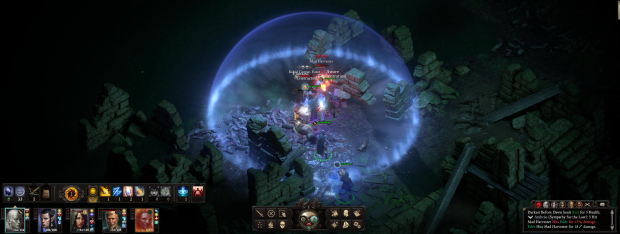
A world where children are being born without souls, scarring generations, while warring factions of a terrifying god attempt to take control: great story, lots of impact. That was PoE1. A world where some giant is stamping somewhere else you can’t see, and there’s a trade war going on that endlessly suggests the complicity of the natives? Yeah, it’s not exactly gripping.
Perhaps more damningly, I just didn’t care about any of the companions. Aloth and Eder didn’t do much for me last time, and just the bare minimum effort has gone into advancing either as people – they feel like a band lazily relying on their old hits. Of the new crowd, I quite liked Maia, and her pet parrot Ishi. But mostly because she didn’t complain as much as the others. They’re a dreary group.

Exploring the nautical map, finding all the undiscovered islands, taking on pirates, or indulging in some piracy, looting shipwrecks, it all sounds like it should be so much more fun. But in execution it’s mostly an elaborate menu. Find a battle on an island and you’ll be in a single location, and when the fight’s over, there’s nowhere to explore, no hidden treats, no dungeons to deep dive. There’s really nothing to be gained, beyond easily bought resources, from exploration, which is such a miss.
I think that describes a lot of what I’ve seen so far: swings and misses. The naval battles are beautifully delivered, but almost immediately redundant, and don’t meaningfully impact a boarding raid. The story is enormous and intricate, but doesn’t feel weighty or important. The combat is astonishingly detailed, but played at the standard setting rarely requires you to use its many mechanisms.
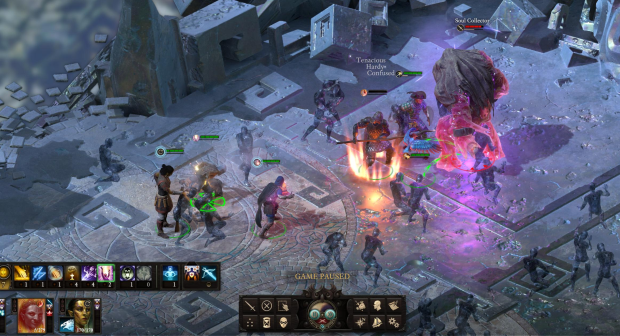
And yet the depth and wealth of effort that’s gone into its world building does have an impact on me. The sense of a place is unquestionably wonderful, and goodness me, there’s so much writing and voice acting in here (gone are PoE1’s awkward half-voiced conversations, with every NPC line spoken aloud). There is a vast amount to do, and it’s undeniably absorbing to busily bustle about the waters, ticking off quest after quest.
I’ve yet to finish it, in a large part because a colleague warned me that by following the main quest too early, he inadvertently locked himself out of a lot of the side quests, with the game offering no warning. My feelings may change as I see the story to its end, and I will write again to say.
There’s no doubt that a new player could play PoE2 without having played the original. But they’d be a person not really understanding an awful lot of what was going on. And, frankly, if you’re interested in playing this game, then you’re interested in playing the original, and should. It’s the better game. And this is very much a sequel that, despite a new setting, many new characters, and a new overarching plot, relies heavily on the enormous volumes of lore and history that the original taught. Often with the most peculiar assumption that you’ll have remembered every detail of a sixty hour, three year old game, or be as in the dark as to who this character that recognises you might be as anyone approaching this game first. Wirtan? No clue. Chatted to me like an old friend.
I wish PoE2 had had more to say, more it wanted to express. I think that would have covered over a multitude of its other sins. Half-ideas about colonialism mixed with exploitation of natural resources by trading companies don’t really deliver the goods here. (That is the best joke.) As it is, despite having spent dozens of hours playing this, I’ve always felt at arm’s length.
Italian review is out. 83/100
https://multiplayer.it/recensioni/1...sione-di-pillars-of-eternity-ii-deadfire.html
They say the narrative is worse than the one in PoE 1, how the hell can that be possible, it's like saying North Korea is better than South Korea
Also RPS says the same thing, the story is worse than the first one and characters are not that interesting, how the fuck?

I noticed that on such sites EVERY game rated with SAME scores, so I don't think they trust-able sources anymore. I think it's better wait for more people from community and codex before judge.Review post:
MMORPG.com 10/10
GameSpace 9.8/10
CGMagazine 9.5/10
GamesBeat 92/100
Game Informer 8.75/10
PC Gamer 88/100
IGN 8.5/10
GameSpot 8/10







